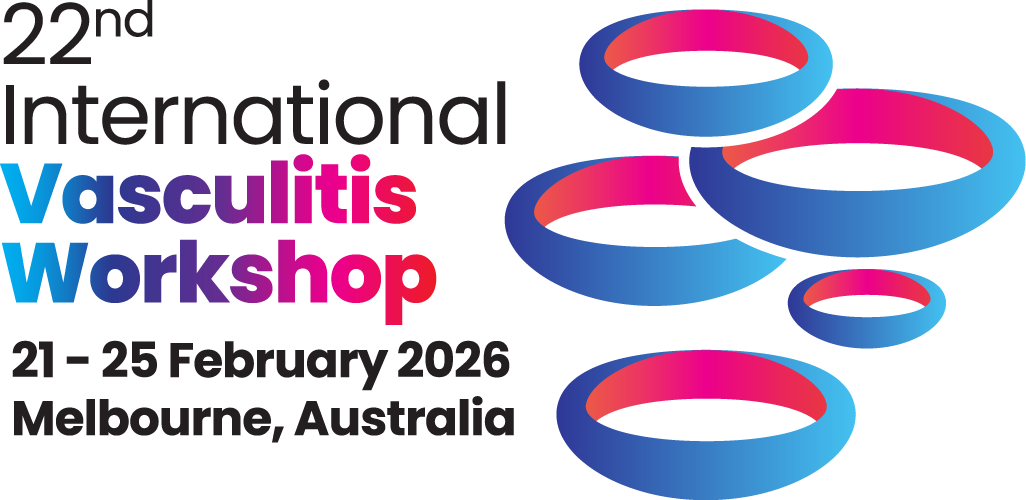Abstracts are invited to be submitted for the 22nd International Vasculitis Workshop 2026. Submissions can be made via the Abstract Submission Portal linked below.
All abstracts must follow the instructions listed below, and be submitted online by 23:59 (AEST), Monday 29 September 2025. Please note that the closing date for abstract submission will not be extended.
Accepted abstracts will, as was the case for the last two Workshops, be published on Zenodo, an open-access platform that publishes and preserves research outputs.
Presentation Types
Abstracts can be submitted for either of the presentation types below:
Oral Presentation
All oral presentations will be grouped into sessions throughout the Workshop. Further details about oral presentations will be sent to presenting authors after abstract review.
Posters
Poster presentations will be on display throughout the Workshop. Poster presenters will have the opportunity to present their poster and answer questions from delegates during the Workshop.
All Abstracts will be reviewed and assigned, based on scoring, to an Oral Presentation Session or to be presented as a Poster.
Abstract Themes
Authors are required to select a theme for their abstract submission. Themes are listed below.
1. Clinical Science
- 1.1 Epidemiology
- 1.2 Diagnosis and classification
- 1.3 Disease Assessment (including activity, response and damage)
- 1.4 Imaging
- 1.5 Organ-specific manifestations and management of specific situations
- 1.6 Treatment (including trials, observational data, current and new therapies)
- 1.7 Complications of Vasculitis
- 1.8 End-organ damage
- 1.9 Comorbidities and their management
- 1.10 Outcomes (including patient-reported outcomes)
- 1.11 Precision medicine approaches
- 1.12 Secondary vasculitis
- 1.13 Health systems and models of care
- 1.14 Case Series and Case Reports
2. Translational Science
- 2.1 Genetics and epigenetics
- 2.2 Vasculitis and environmental/acquired factors
- 2.3 Cellular and molecular mechanisms of disease: Adaptive immunity
- 2.4 Cellular and molecular mechanisms of disease: Innate immunity
- 2.5 Mechanisms of tissue injury
- 2.6 Mechanisms of tissue repair and fibrosis
- 2.7 Biomarkers
- 2.8 Emerging technologies and approaches (including AI)
3. Other
- 3.1 Educational Initiatives (including on-line tools and social media)
Abstract submissions will need to identify what type of vasculitis is included in their abstract. If the abstract includes more than one type of vasculitis, please indicate the main type or use “no specific disease”.
- 1 ANCA-associated vasculitis (GPA or MPA)
- 2 ANCA-associated vasculitis (EPGA)
- 3 Anti-GBM disease
- 4 IgA vasculitis
- 5 PAN
- 6 Kawasaki disease
- 7 GCA (includes PMR)
- 8 Takayasu’s arteritis
- 9 Behçet’s syndrome
- 10 Other forms of vasculitis (includes secondary vasculitis, cryoglobulinaemic vasculitis, primary CNS vasculitis, IgG4-RD, cutaneous small vessel vasculitis, hypocomplementaemic urticarial vasculitis, relapsing polychondritis, genetically associated vasculitides, vasculitis due to ADA2 deficiency, VEXAS syndrome)
- 11 No specific disease
Key Dates
| Call for abstracts open | 28 March 2025 |
| Call for abstracts close | 29 September 2025 |
| Notifications sent to presenters | 9 October 2025 |
| Deadline for presenters to register | 31 October 2025 |
Terms & Conditions
- There are no templates for abstracts. The submission format will be “type in the box” for the body of the abstract
- Authors can submit multiple abstracts
- Authors can nominate only one presenting author per abstract submission
- Abstracts must be a maximum of 300 words (excluding title, authors and affiliations)
- Abstract titles must be maximum of 25 words, be descriptive and not contain abbreviations
- Abstracts must be thoroughly checked for spelling and grammar before submission
- Abstracts may contain standard abbreviations (spelled out on first use)
- Abstracts may contain scientific symbols
- Abstracts must not contain figures or diagrams
- Abstracts should be submitted only in the English language
- Abstracts are required to use the following headings:
Background/Aims:
Methods:
Results:
Conclusions: - All authors listed on the abstract must approve of submitting their work for presentation
- The work within the Abstract must not have been published prior to Monday 29 September 2025
- At least one author needs to be available to present if selected and will be required to have registered for the workshop
- Only abstracts submitted via the abstract submission portal (linked above) will be considered
- All abstracts must be submitted by 23:59 (AEST), Monday 29 September 2025 to be considered
Awards and Travel Grants
Two awards will be presented to Young Investigators, based on the assessment of their abstract and presentation in a dedicated session. One award will be presented in Clinical Science, the other in Translational Science. ECRs/trainees whose abstract has scored the highest at review will be invited to present in the dedicated Young Investigator Award session.
A limited number of travel grants will be available to ECRs and Trainees who submit an Abstract and present it at the Workshop.
To be eligible for Awards and Travel Grants, applicants must be defined as an Early Career Researcher (ECR) or Trainee. To be considered for this award, you must submit relevant evidence through the Abstract Submission Portal. A template for the required evidence is provided in the link below.
Definitions
Early Career Researchers (ECRs)
Defined as a clinician/researcher or scientist who has been awarded, within the past five years, a higher research degree (eg PhD/Masters), or is within 5 years of their specialist clinical qualification, or junior faculty within 5 years of appointment.
Career interruptions arising from professional or personal matters can be considered when determining the 5-year timeframe, including part-time work or leave due to, for example, parental leave or illness.
Trainees
Defined as someone who is enrolled for a degree (eg PhD, Masters) or who is in specialist or clinical training (eg as a resident or registrar, or as a medical student).
All Abstracts will be reviewed and assigned, based on scoring, to an Oral Presentation Session or to be presented as a Poster.
Enquiries
For all abstract enquiries, please contact the Secretariat.
